Musk’s Starlink defies order to block X in Brazil | ex-Google chief Eric Schmidt warns we may have to pull plug on AI | China warns Japan of retaliation for possible new chip curbs
Good morning. It's Tuesday 3rd August.
The Daily Cyber & Tech Digest focuses on the topics we work on, including cybersecurity, critical technologies, foreign interference & disinformation.
Follow us on Twitter and on LinkedIn.
Elon Musk is doubling down on his fight with the Brazilian authorities. For weeks, the billionaire has refused to comply with Brazilian court orders to suspend certain accounts on his social network, X. Now he is defying the Brazilian government again. Starlink — the satellite-internet service controlled by Mr. Musk that has 250,000 customers in Brazil — told the country’s telecom agency on Sunday that it would not comply with orders to block X, the agency’s president said. The New York Times
In a wide-ranging interview at the Australian Strategic Policy Institute’s Sydney Dialogue on Monday, Dr Schmidt said artificial intelligence would radically alter the efficiency of business, medicine, education and science – but that came with enormous risks. There may come a time when AI should be unplugged, Dr Schmidt warned. He said China was devoting tens of thousands of people to reclaiming the lead on AI from players like Microsoft, Google and OpenAI. Australian Financial Review
China has threatened severe economic retaliation against Japan if Tokyo further restricts sales and servicing of chipmaking equipment to Chinese firms, complicating US-led efforts to cut the world’s second-largest economy off from advanced technology. One specific fear in Japan, Toyota privately told officials in Tokyo, is that Beijing could react to new semiconductor controls by cutting Japan’s access to critical minerals that are essential for automotive production, the people said, declining to be named discussing private affairs. Bloomberg
ASPI
Why ex-Google chief Eric Schmidt warns we may have to pull plug on AI
The Australian Financial Review
Sam Buckingham-Jones
In a wide-ranging interview at the Australian Strategic Policy Institute’s Sydney Dialogue on Monday, Dr Schmidt said artificial intelligence would radically alter the efficiency of business, medicine, education and science – but that came with enormous risks. There may come a time when AI should be unplugged, Dr Schmidt warned. He said China was devoting tens of thousands of people to reclaiming the lead on AI from players like Microsoft, Google and OpenAI.
The World
Musk and Durov are facing the revenge of the regulators
The Washington Post
Will Oremus
The world’s internet regulators are no longer playing around. Two days after France indicted Telegram CEO Pavel Durov on a range of charges, Brazil on Friday ordered the suspension of Elon Musk’s X after it defied a mandate to designate a legal representative in the country. The crackdowns, which come months after the United States passed a law that could lead to the banning of TikTok, herald the end of an era. Not the social media era, which is still going strong. But the era in which tech titans enjoyed free rein to shape the online world — and a presumption of immunity from real-world consequences.
Australia
Albanese government’s plan to further subsidise NBN ‘inflationary’: TPG
The Australian
Jared Lynch
TPGTelecom chief executive Inaki Berroeta says the Albanese government’s plans to extend a scheme that subsidises the cost of the NBN will be a “double dip” and lead to higher prices. The government is reviewing the Regional Broadband Scheme, in which commercial telcos pay a levy for NBN Co to provide coverage in areas that would otherwise not be commercially viable. The Australian Competition & Consumer Commission has supported a move to extend the RBS to fixed wireless services, saying they represent a competing service to the NBN and therefore should be subject to the levy.
China
China warns Japan of retaliation for possible new chip curbs
Bloomberg
Jenny Leonard, Mackenzie Hawkins, and Takashi Mochizuki
China has threatened severe economic retaliation against Japan if Tokyo further restricts sales and servicing of chipmaking equipment to Chinese firms, complicating US-led efforts to cut the world’s second-largest economy off from advanced technology. One specific fear in Japan, Toyota privately told officials in Tokyo, is that Beijing could react to new semiconductor controls by cutting Japan’s access to critical minerals that are essential for automotive production, the people said, declining to be named discussing private affairs.
China's auto insurers must keep pace with driverless tech: white paper
Nikkei Asia
Wu Yujian and Kelsey Cheng
The rapid rise of autonomous vehicles is exposing a critical gap in China's automotive insurance market, with providers needing to ramp up the design of new coverage strategies and liability frameworks to keep pace with technological advancements, according to a new white paper.
ByteDance eyes $9.5 billion in record Asia dollar corporate loan
Bloomberg
Chien Mi Wong
ByteDance, the Chinese owner of TikTok, is tapping banks for a $9.5 billion loan that would be the biggest dollar-denominated corporate facility in Asia ex-Japan, according to people familiar with the matter. Citigroup, Goldman Sachs and JPMorgan are the coordinators of the latest financing, which carries a tenor of three years and can be extended to a maturity of up to five years, said the people, who asked not to be identified discussing a private matter.
Key events during China's regulatory scrutiny of Alibaba
Reuters
China's State Administration of Market Regulation said on Friday that Alibaba had completed three years "rectification" following a record $2.75 billion fine levied in 2021 for monopolistic practices.The regulator said Alibaba had achieved "good results" and that it would continue to "guide" the e-commerce giant to "regulate its operations and improve its compliance and quality".
China EV sales rise on government subsidies, inventory buildup
The Wall Street Journal
Jiahui Huang
Chinese electric-vehicle makers reported stronger sales and deliveries in August, thanks to Beijing’s expanded car trade-in program and auto dealers building inventories for the September and October peak season. Analysts said the strong August sales were largely in line with market expectations and driven mainly by the government’s more aggressive trade-in program.
Chinese chip start-up Xiangdixian collapses amid cash crunch and legal woes
South China Morning Post
Xinmei Shen
Chinese semiconductor start-up Xiangdixian Computing Technology has reportedly collapsed amid a cash crunch and dismissed all employees, highlighting difficulties faced by domestic chip firms despite a nationwide self-sufficiency push. Xiangdixian, based in China’s southwestern city of Chongqing, held an all-staff meeting on Friday where it announced the dissolution of the company, terminating the contracts of nearly 400 employees, according to reports from local media.
USA
Trump eyes plan that may give Elon Musk role in auditing U.S. agencies
The Washington Post
Jeff Stein and Trisha Thadani
Behind closed doors, former president Donald Trump and his advisers have been talking for months about forming a commission led by prominent business executives to comb through the government books to identify thousands of programs to cut. Lately, one particularly famous candidate has made clear he’d be up for it: Elon Musk. And he may have much to gain personally from the endeavor.
Apple helped nix part of a child safety bill. More fights are expected
The Wall Street Journal
Jeff Horwitz and Aaron Tilley
As state legislators around the country seek to regulate teen smartphone use, Apple is gearing up for a battle with app makers and legislators over child safety. The question at the heart of the fight is whether regulation of teen social-media use should happen entirely within apps or whether smartphone makers and app stores also have a role to play. Driven by the alleged risks of social media to teen mental health—as well as examples of social-media apps being used to sell drugs to minors and recruit child sex-abuse victims—a wave of states have proposed or passed legislation to regulate platforms.
Social networks can’t be forced to filter content for kids, says judge
The Verge
Adi Robertson
A federal judge issued a last-minute partial block on a Texas law that would require some large web services to identify minors and filter what they see online. Called HB 18 or the Securing Children Online Through Parental Empowerment (SCOPE) Act, it was signed into law last year and was set to take effect over the weekend on September 1st. But a late Friday court ruling determined that the “monitoring and filtering” requirements posed a significant threat to online speech.
Americas
Musk’s Starlink defies order to block X in Brazil
The New York Times
Jack Nicas
Elon Musk is doubling down on his fight with the Brazilian authorities. For weeks, the billionaire has refused to comply with Brazilian court orders to suspend certain accounts on his social network, X. Now he is defying the Brazilian government again. Starlink — the satellite-internet service controlled by Mr. Musk that has 250,000 customers in Brazil — told the country’s telecom agency on Sunday that it would not comply with orders to block X, the agency’s president said.
Brazilians seek out social-media alternatives after ban on Elon Musk’s X
The Wall Street Journal
Ryan Dubé
When Brazilians logged on to Elon Musk’s X this weekend, they found a blank website with a simple message: “It’s not possible to access this site.” After Brazil’s Supreme Court shut down the social-media platform on Saturday, Brazilians were migrating to other apps in Latin America’s biggest nation, which has one of the world’s most active online populations.
Chile and South Korea look to a lithium alliance
East Asia Forum
Anthony V Rinna
South Korea is looking to build a strategic partnership with Chile to secure diverse supply chains of lithium, a crucial component in electric vehicle battery production. This collaboration could see Chile benefitting from South Korean capital and technology, while South Korea looks to acquire a steady lithium supply and a higher position in global value chains. But the partnership must be managed so that it benefits the Chilean people and supports the country's economic development and green energy efforts.
North Asia
Japan's Hokkaido eyes New York state model for chip hub ambitions
Nikkei Asia
Hajime Tsukada
With about eight months until the scheduled start of a prototype line at chipmaker Rapidus' new plant in Hokkaido, officials in Japan's northernmost main island view New York state's creation of a semiconductor ecosystem around an IBM research base as a model to nurture the industry. The plant is not far from the runways at New Chitose Airport, Hokkaido's main airport and the gateway to its biggest city, Sapporo.
Taiwan says Trump wrong to say island took US chip industry
Bloomberg
Yian Lee
Taiwan’s economy minister pushed back at criticism of the island by Republican presidential nominee Donald Trump, and denied the island took the US chip industry. “Of course Taiwan is not stealing the chip industry from the US,” Minister of Economic Affairs Kuo Jyh-huei told reporters in Taipei on Monday. “The chips we made are commissioned by US companies, which still have the highest gross margin. Trump might have some misunderstanding on such matters, and we will clarify that.”
Japan wants more rural data centers, and light-based networks may help
Nikkei Asia
Kiu Sugano
Japan's government is planning support for high-speed, light-based communications technology that could help with building more data centers outside of big cities, Nikkei has learned. The aid, which would include subsidies, could begin as early as next year. The Ministry of Internal Affairs and Communications and the Ministry of Economy, Trade and Industry will discuss the proposals this month.
NZ & Pacific Islands
China is likely to step up influence operations in Palau
The Strategist
Jessica Caterson
Palau has already been the target of Chinese information operations, and there are several indicators that those efforts are now being directed at the election. China is likely to implement refined tactics that it previously used in the recent Philippine and Taiwan presidential elections. Urgent action to guard against interference is crucial to protect Palau’s democratic process and sovereignty as a whole. Propaganda and censorship have been used by China to directly manipulate its messaging worldwide. For example, China has made several attempts to gain a foothold in Palau’s domestic media ecosystem.
Europe
Behind the arrest of Telegram boss, a small Paris cybercrime unit with big ambitions
Reuters
Gabriel Stargardter
The investigation into Telegram boss Pavel Durov that has fired a warning shot to global tech titans was started by a small cybercrime unit within the Paris prosecutor's office, led by 38-year-old Johanna Brousse. The arrest of Durov, 39, last Saturday marks a significant shift in how some global authorities may seek to deal with tech chiefs reluctant to police illegal content on their platforms. The arrest signalled the mettle of the J3 cybercrime unit, but the true test of its ambitions will be whether Brousse can secure a conviction based on a largely untested legal argument, lawyers said.
Europe must rely less on Chinese technology, Danish PM says
Financial Times
Raphael Minder
Europe should depend less on China for technology and show it has learned its lessons about relying too much on a single supplier, as it did previously with Russian oil and gas, Denmark’s prime minister has warned. In an interview with the Financial Times, Mette Frederiksen urged Europeans to change “our attitude, the way of looking at the world, which is based on peacetime”. Instead, she called for greater awareness of Beijing’s role in allowing Russia to extend its invasion of Ukraine into a third year.
Belgian schools launch crackdown on smartphones
POLITICO
Pieter Haeck
Hundreds of schools across Brussels and Belgium's southern region of Wallonia are set to follow the institution's example. Over the summer, the Francophone community's new government announced plans for a smartphone ban in primary schools and the first three years of secondary schools. The trend isn't catching on only in Belgium: The Netherlands has a ban on the devices, and education ministers in France and Ireland said last week that they were also considering it.
UK
How cyber hacking gangs steamroll global healthcare into ransom shakedowns
The National News
Tariq Tahir
The hackers used malware to encrypt vital information and render Synnovis's IT systems useless, then downloaded sensitive patient data. The gang demanded $50 million to end the attack. Their activities are part of a spike in ransomware attacks on health care organisations, as criminals increasingly turn to stealing large quantities of patient data as a means of making money. The attack highlights how health care systems are increasingly coming under attack from ruthless gangs, who know all too well the leverage they hold over organisations in the sector, for whom it’s a matter of life and death.
Africa
Nigerian fintech chief fined $250mn after holdings described as a ‘fiction’
Financial Times
Aanu Adeoye
A US federal court has ordered a Nigerian businessman, who last year sought to buy the English football club Sheffield United, to pay more than $250mn in fines and barred him from serving as a director of a public company. Last year, the US Securities and Exchange Commission had charged Dozy Mmobuosi and three of his companies, including two Nasdaq-listed enterprises, with fraud for inflating the “financial performance metrics of his companies and key operating subsidiaries to defraud investors worldwide”.
Big Tech
Musk’s Twitter investors have lost billions in value
The Washington Post
Faiz Siddiqui
Since late last year, Fidelity has consistently valued the X stake in one of its funds 70 percent below the purchase price, a drop in valuation first reported by Axios. Figures released Friday show that Fidelity now values that stake about 72 percent lower than when Musk took over X, taking its overall portion of the company from a valuation of around $316 million to $88 million.
Intel CEO to pitch board on plans to shed assets, cut costs, source says
Reuters
Max A. Cherney and Milana Vinn
Intel CEO Pat Gelsinger and key executives are expected to present a plan later this month to the company’s board of directors to slice off unnecessary businesses and revamp capital spending, according to a source familiar with the matter, as they try to revive the once-dominant chipmaker's fortunes. The plan will include ideas on how to shave overall costs by selling businesses, including its programmable chip unit Altera, that Intel can no longer afford to fund from the company’s once-sizeable profit.
Strava and Letterboxd surge as users crave social-media refuge
Bloomberg
Teresa Xie
Strava launched in 2009 as a niche website for cyclists to log mileage. During the pandemic, it blossomed into a mobile app serving more than 120 million athletes as worldwide lockdowns drove people outdoors. Now that audience sees something else in Strava: a place to engage more easily with people over a common interest. Its growing appeal reflects a surge in affinity-based platforms — like Letterboxd for movie buffs and GoodReads for book lovers — that provide a refuge from social-media giants, while offering other businesses a new way to target consumers
Amazon and Bezos fund’s influence over carbon credit market raises alarm
Financial Times
Kenza Bryan
The influence of Amazon and Jeff Bezos’s $10bn charitable group over the carbon credit market is raising alarm, in a growing battle over how Big Tech and corporate groups seek to achieve tough climate goals. The Bezos Earth Fund is among the largest funders of the Science Based Targets initiative, a globally-renowned body relied upon by groups such as Apple and H&M to set voluntary standards and strict limits on the use of carbon credits to offset emissions.
Artificial Intelligence
Canva triples prices citing the need to pay for new AI design tools
The Australian Financial Review
Paul Smith
Canva has hiked the subscription price for its design software by up to 300 per cent for some customers as the Sydney-based firm shores up its revenues, woos United States investors and considers a Nasdaq listing. The company notified some of its largest clients of the higher subscription prices late last week, attributing them to a need to invest more in the software, including introducing artificial intelligence-powered design tools.
Misc
$13 for a video call. $25 for a movie. Tablets connect prisoners—at a steep price.
The Wall Street Journal
Nicholas G. Miller
In prisons and jails across the country, a bulky tablet enclosed in a screwed-on plastic case has become the hottest new device. Featuring limited online access, the tablets allow incarcerated people to make calls, send messages and watch movies from their cells. They also give prison telecommunication companies and correctional facilities another source of revenue when profits from phone calls, which have long been the industry’s principal business, are getting squeezed.
Netflix Is trying to get you hooked on more reality TV with better dubbing
The Wall Street Journal
Jiyoung Sohn and Timothy W. Martin
A push by Netflix to keep its subscribers hooked involves 90-minute cram sessions on South Korean culture and expressions to ensure better-quality dubbing and translations. The streaming giant is trying to help unscripted reality TV—a genre that often proves difficult to export—and other non-English content find global appeal. As it faces increased competition in streaming, Netflix aims to help shows that are popular in one market—such as South Korean dating shows, physical competitions and game shows—take off internationally.
Events
Cyber threats, disinformation and sabotage: Lessons learnt from Russia's war in Ukraine
United States Studies Centre
What lessons can we learn about cyber threats and the role of technological innovation from the war in Ukraine? What do these trends tell us about cyber threats and opportunities in the future? How can NATO and partners in the Indo-Pacific apply these lessons in the ongoing technological race against potential adversaries and strategic competitors? To discuss these issues, you are cordially invited to a USSC public forum featuring NATO Deputy Assistant Secretary General for Innovation, Hybrid and Cyber James Appathurai in conversation with Dr Michael Green.
Jobs
ASPI Research Internship
ASPI
Have you recently completed your studies (undergraduate or postgraduate) and want to develop your expertise in defence, foreign and national security policy, including in areas such as strategic competition, defence, deterrence, foreign interference, technology, and security? Do you want to inform the public and government on the critical strategic choices facing Australia and learn what it takes to be a professional analyst? If so, apply for the ASPI Research Internship Program! Please note that this is a paid internship program. Applications will close at midnight Friday 27 September 2024.
The Daily Cyber & Tech Digest is brought to you by the Cyber, Technology & Security team at ASPI.

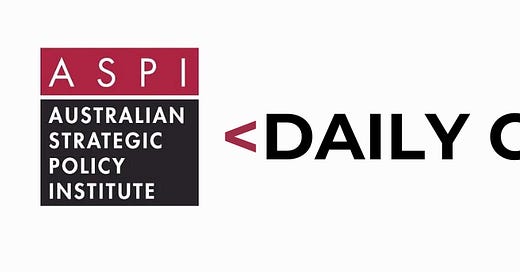




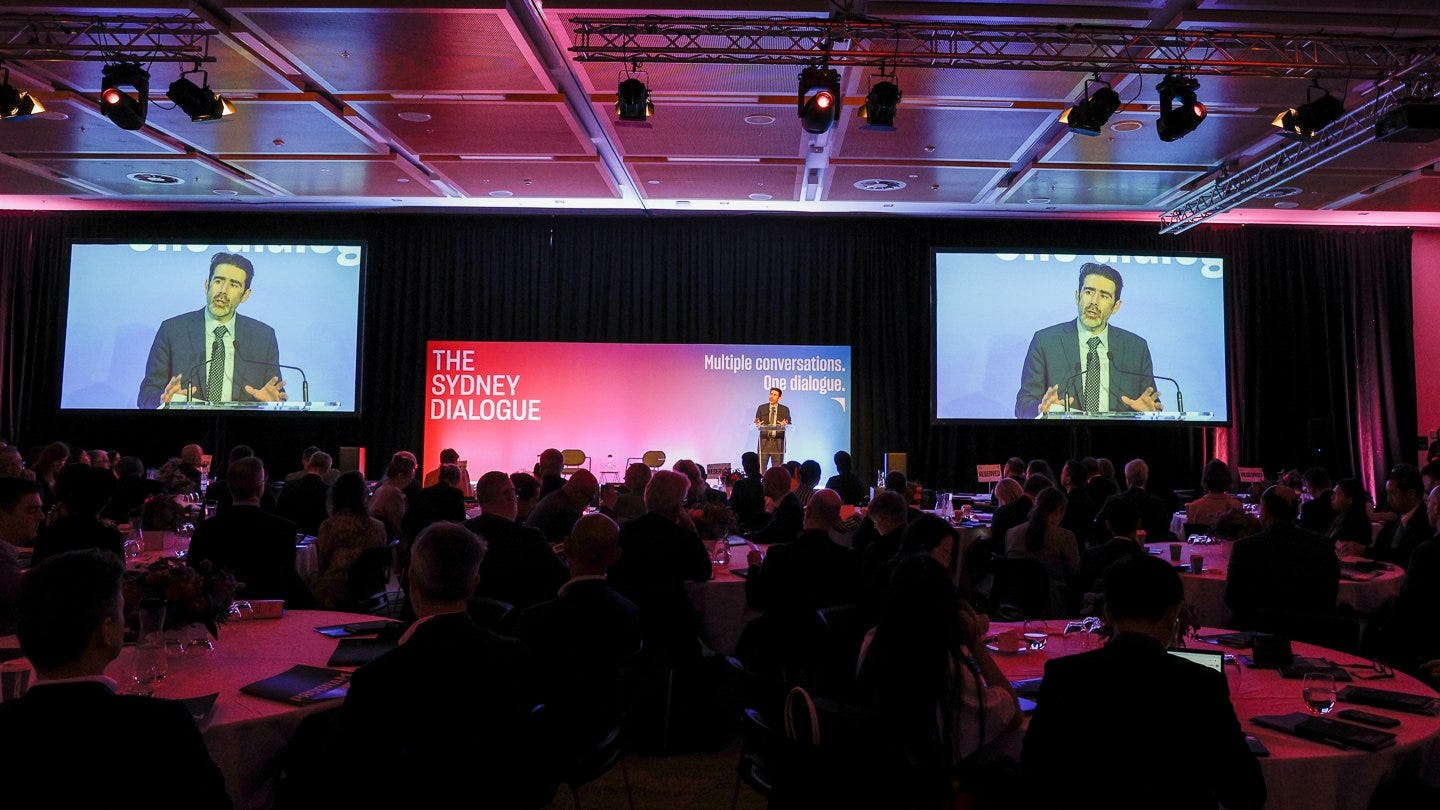
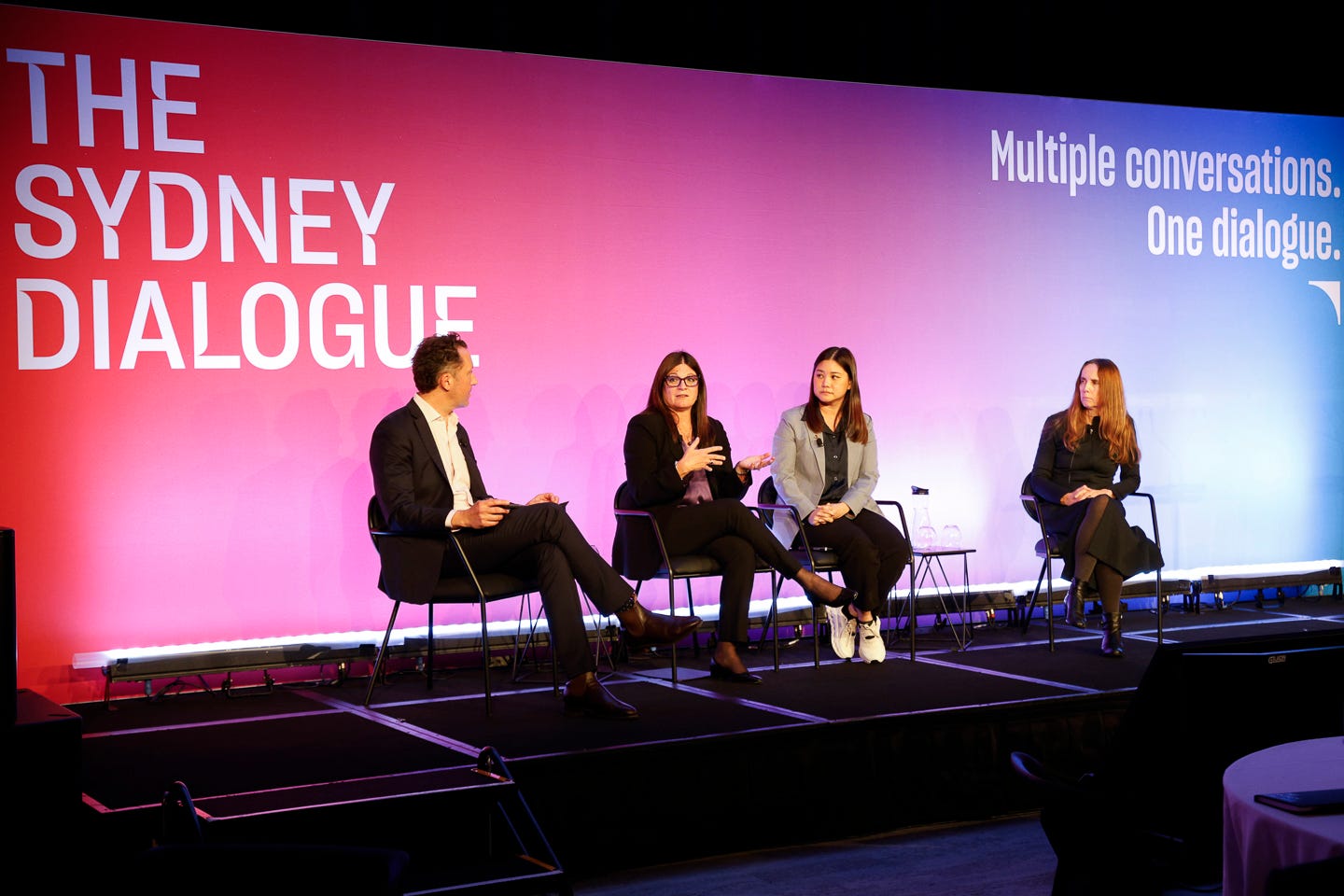
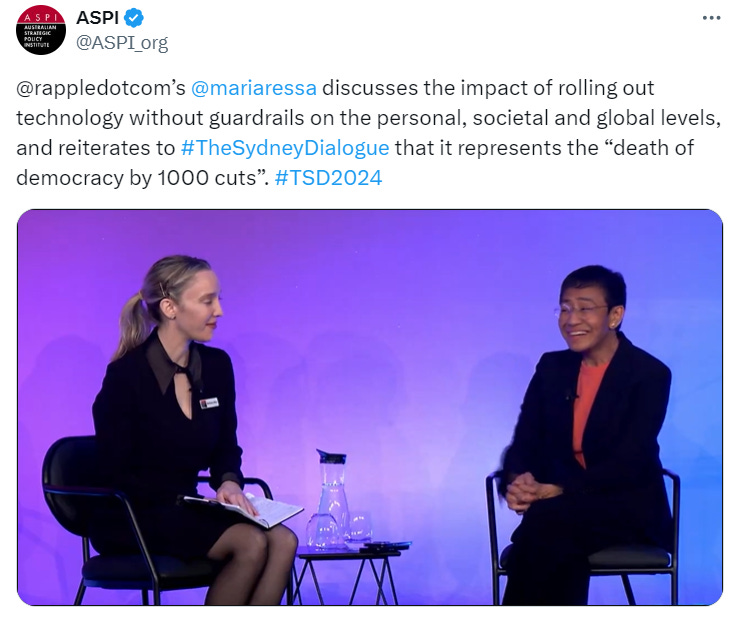
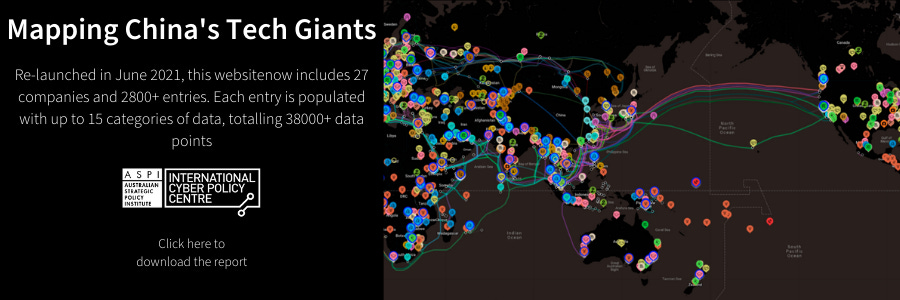
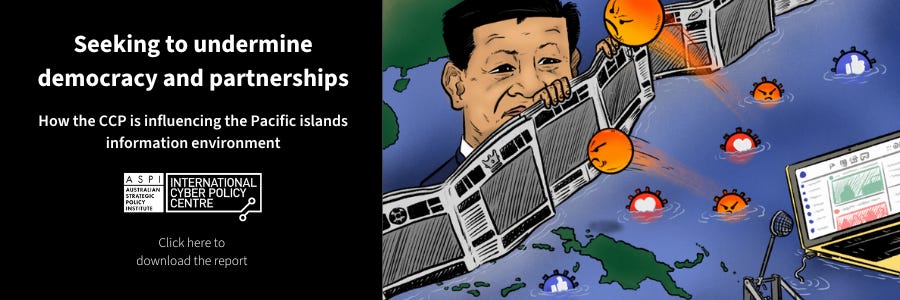

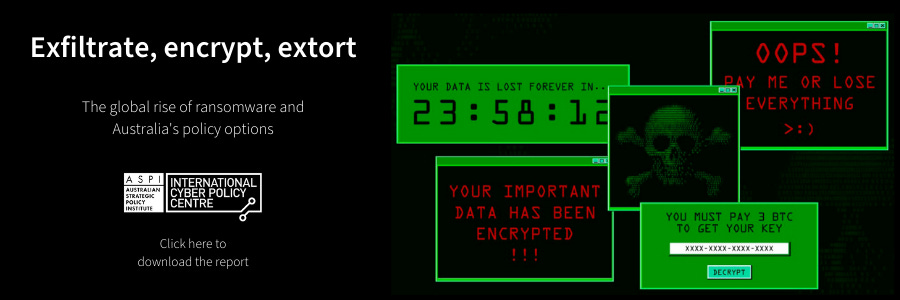

I think there's a typo on the date of this post. It should be 3rd Sept, not 3rd August. Great article, though.